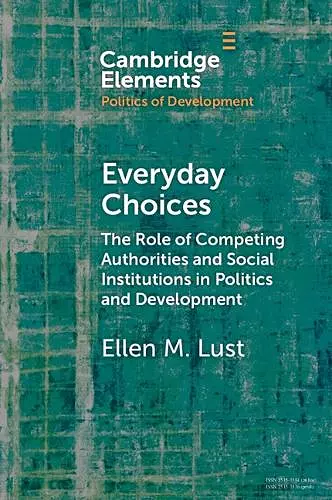Everyday Choices
The Role of Competing Authorities and Social Institutions in Politics and Development
Format:Paperback
Publisher:Cambridge University Press
Published:8th Dec '22
Currently unavailable, and unfortunately no date known when it will be back

Setting the state and non-state authorities on equal footing fosters knowledge accumulation and more effective development programming.
This Element establishes a framework elucidating state and non-state authorities, which is key to knowledge accumulation, designing future research and effective programming. This title is also available as Open Access on Cambridge Core.Scholars and practitioners seek development solutions through the engineering and strengthening of state institutions. Yet, the state is not the only or the primary arena shaping how citizens, service providers and state officials engage in actions that constitute politics and development. These individuals are members of religious orders, ethnic communities, and other groups that make claims on them, creating incentives that shape their actions. Recognizing how individuals experience these claims and view the choices before them is essential to understanding political processes and development outcomes. This Element establishes a framework elucidating these forces, which is key to knowledge accumulation, designing future research and effective programming. Taking an institutional approach, this Element explains how the salience of arenas of authority associated with various communities and the nature of social institutions within them affect politics and development. This title is also available as Open Access on Cambridge Core.
ISBN: 9781009306126
Dimensions: 228mm x 152mm x 6mm
Weight: 150g
75 pages